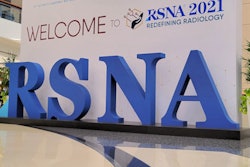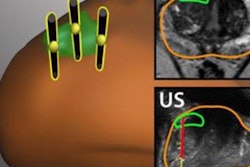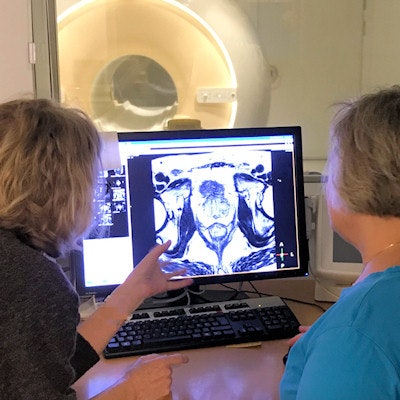
Quality in imaging is never guaranteed -- that is why working toward European-wide accreditation for prostate MRI is the way forward, expert speakers explained at this morning's ECR Master Class. Benchmarking quality in acquisition and reporting must be set within clear clinical pathways, and it is a vital part of the accreditation process.
Standardized accreditation is what the medical imaging community aspires to, according to session moderator Dr. Jonathan Richenberg, a consultant radiologist at the Royal Sussex County Hospital in Brighton, U.K.
Standards are looming large, but it is no good having two standards, and they must recognize prostate cancer programs within departments, he said. The priority now is to develop an effective strategy to roll out multiparametric MRI as quickly as possible without sacrificing quality.
"It is widely accepted that multiparametric MRI is 'good' in prostate cancer, but what does 'good' mean? How do we measure 'good'? And how do we make 'good' universal?" Richenberg asked. "The creation of an accredited unit starts with an attitude to encourage people to use multiparametric MRI, but having state-of-the-art equipment is no good if you do not know how to use it. It is like having a fancy car and not knowing how to drive it."
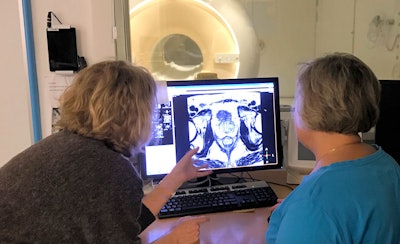 Multiparametric MRI of the prostate can be a complex examination. All images courtesy of Dr. Vibeke Logager.
Multiparametric MRI of the prostate can be a complex examination. All images courtesy of Dr. Vibeke Logager.Radiologists need to benchmark themselves against good quality standards, and he urges ECR 2019 delegates to get involved in the process because they have a vested interest in doing this. He hopes today's session will stimulate mature discussion to a wide audience and boost acceptance of quality checking toward establishing an accredited program. The most important contribution toward accreditation is face-to-face discussions in a multidisciplinary team. This is highly valued because it brings the benefits of timely feedback, which is a vital component of improved care, he added.
Richenberg is also keen to encourage mentorship schemes in any new training curricula, noting that the value of learning from one and other is most important in skill acquisition sets. He also supports engaging in e-learning schemes for continuing medical education and organizing workshops within departments for experiential learning situations.
There is an intrinsic need among radiologists to improve, and he suggested that the first cohort of radiologists to make it through an accredited program would need to become the future mentors, he cautioned that there may still be a skill gap between implementation and roll out of such schemes. In the U.K., having the Royal College of Radiologists on board has been essential in terms of quality-assured benchmarking of programs.
Looking to the future, Richenberg, who is an honorary senior lecturer at Brighton and Sussex University Hospitals National Health Service Trust, warned that radiologists must "be careful not to be seen as elitist, self-appointed experts, and judge and jury when making the case for the accreditation process."
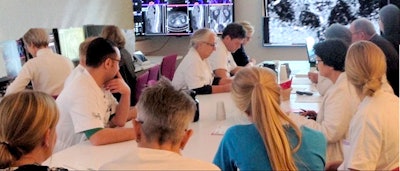 Multidisciplinary team meetings play a central role in the management of prostate cancer.
Multidisciplinary team meetings play a central role in the management of prostate cancer.Radiologists have worked tirelessly to improve prostate imaging, yet there still remains much to do, noted Dr. Vibeke Logager, an associate professor of radiology at Herlev Hospital in Copenhagen, Denmark. She points out that one of the most important aspects for specialist prostate centers is that interactive radiology can guide referring clinicians to the most appropriate imaging modality.
"High-end specialist prostate centers that are involved in international research is the way to go," Logager said. Cooperation with other clinicians, pathologists, and oncologists, together with state-of-the-art equipment, will mean that these units will gain substantial, specialist experience, but cooperation is central to the realization of this goal across Europe.
It is vital to raise the basic level of knowledge in the radiological community and beyond, especially for those working with prostate cancer patients, she continued. Also, imaging quality must be benchmarked against standards, and radiologists should compare their work against that of others.
Logager made specific reference to the importance of a well-educated team of radiographers in order to provide correct angulation of the scans to ensure that radiologists have the best reproducible high-quality images to interpret. Joined-up thinking is critical, especially when accessing data from other hospitals, she added.
"Don't be afraid of comparing your stats regarding numbers of false-negative and false-positive biopsies with well-known state-of-the-art institutions," advised Logager, stating that speed is not always the top priority.
Originally published in ECR Today on 3 March 2019.
Copyright © 2019 European Society of Radiology





